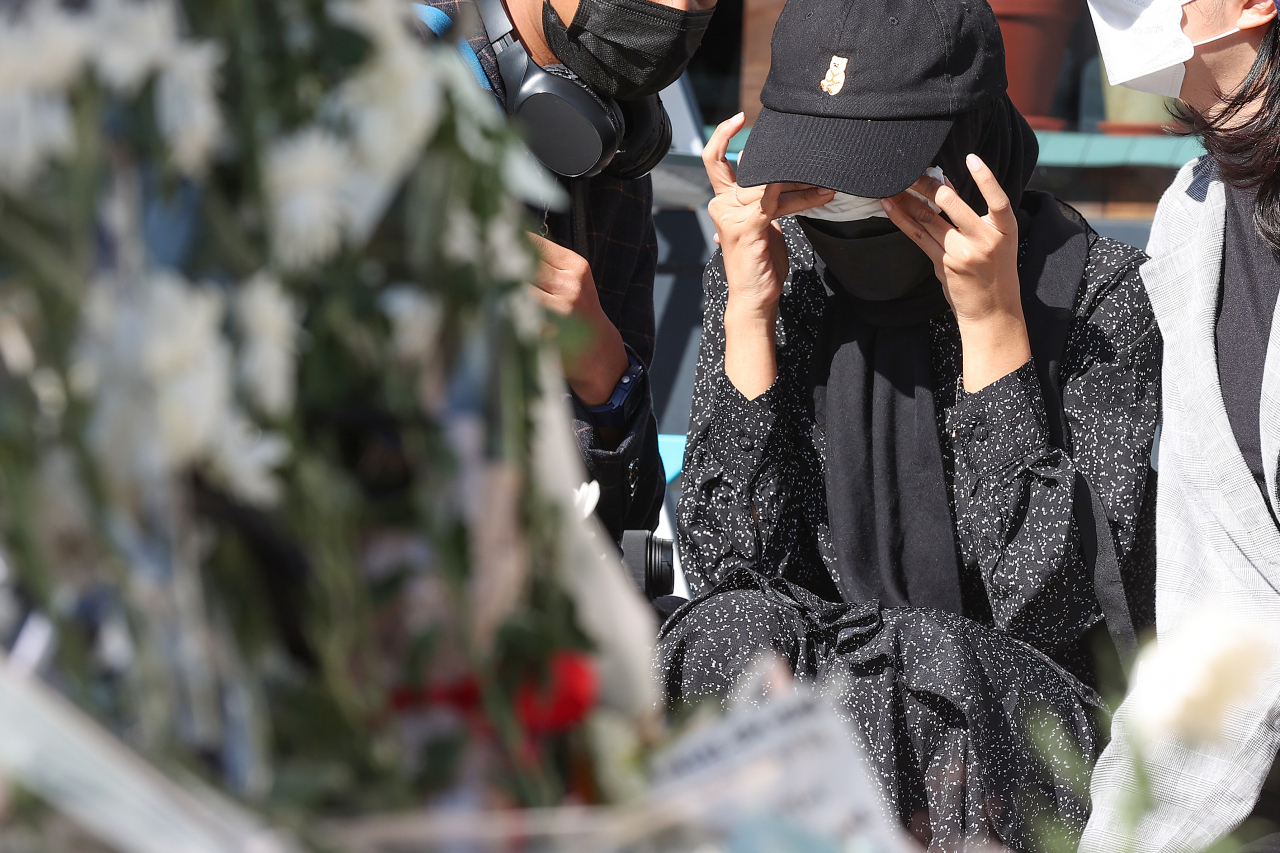'Sorry, we could not protect you': Older Koreans express guilt for disaster
By Shin Ji-hyePublished : Nov. 2, 2022 - 15:20

“I came here to pray. We are very sorry to the young people,” Lee Jeong-ja, 78, said, wiping away tears with a handkerchief at the joint memorial altar at Exit 1 of Itaewon Station on Wednesday afternoon.
“Young people should come here, not the old people like us. I am sorry,” she said, who has a young granddaughter of similar age of the people who died in Itaewon disaster.
Another man surnamed Jeon, 59, who also visited the altar, said, “My heart aches. I am so sorry that we and the state did not protect them. We could have protected them.”
On the Post-it notes that have become a common sight at the locations of tragedies in South Korea, messages of sorrow expressed apology: “Sorry we couldn't protect you.” "Sorry we didn't help you."
It has been five days since the Itaewon disaster took the lives of at least 156 people in a popular nightlife district in central Seoul. As the picture of what happened becomes clearer, increasing numbers of older Koreans are expressing sorrow and guilt for society's failure to protect the victims.
When the disaster was first reported on Naver News, one of the most popular news portals in Korea, many of the comments -- the majority made by Koreans in their 40s -- expressed criticism of younger people for heading to the crowded Itaewon neighborhood to celebrate Halloween, a non-Korean festival.
One commenter went as far as to say that the incident was sad, but young people were responsible for the accident.
There were even questions raised about whether the revelers in Itaewon were on drugs. One of the first questions asked by a reporter at the police briefing hours after the accident was whether there were reports about drug use.
Authorities initially evaded responsibility. Interior Minister Lee Sang-min said the accident would have occurred even with a larger police presence in Itaewon, while Yongsan-gu District Chief Park Hee-young said the office did everything it could do.
But rather than fading, doubts grew about whether the state, the police and the older generation were free from responsibility. The Interior Minister and the district mayor have faced increasing criticism over their remarks and attempts to avoid responsibility.
On Tuesday, the interior minister, Yongsan district mayor, National Police Chief Yoon Hee-keun, and Seoul Mayor Oh Se-hoon -- who was not in Seoul when the accident took place -- all publicly apologized for the disaster.
Emergency call transcripts released by the police have fueled arguments that more could have been done. The calls were made by young people hours before the accident, reporting that they were likely to be crushed and asking for help.
Some experts said that the disaster partly stemmed from the failures of the older generation -- who are in charge of state organizations -- to understand the culture of young people.
Koo Jeong-woo, a professor at Sungkyunkwan University’s sociology department, said older generations did not understand and had no interest in the culture of young people.
“They seemed to think Halloween is just a game of ghosts, and wondered why young people go crazy about it. They just thought it was a weird and fun (event),” he said. “So many police personnel were mobilized to control rallies and demonstrations, though the concentration of people in Itaewon seemed to have more risk factors.”
Estimates based on subway use suggest there were more than 130,000 people in Itaewon, but only 137 police personnel were deployed on the site. Many of them were focused on detecting drug and sex crimes. This is in contrast to the mobilization of more than 4,000 police officers at rallies held in Gwanghwamun and Samgakji the same day.
Professor Seol Dong-hoon of Chonbuk National University said when an accident takes place, people can find the cause in the social structure, the state or the victims. “Finding the cause in the victims is very easy, but you have to be very careful about that,” he said.
Halloween is a cultural event that many young people have enjoyed since childhood, he pointed out.
"Since the 1990s, it has been popular in Korea, starting with day care centers. (Young people) feel familiar with Halloween growing up,” he explained.
“There is nothing wrong with enjoying it. This is like how college students in the 1980s enjoyed Christmas, Valentine's Day and White Day. It doesn't make sense to criticize anyone for enjoying it,” Seol added.
Under the pretext of fostering global talent ahead of the 1988 Olympics, English native speakers were employed at schools nationwide. The teachers exposed students to various aspects of popular American culture -- including Halloween, which many children enjoy.
Lee Taek-gwang, a professor of cultural studies at Kyung Hee University, said young people feel disappointed and helpless seeing the older generation blaming them for the disaster.
“Even up to my generation, we became socialized mainly through acknowledgement by friends, parents, relatives, teachers and other people around us. But now, (millennials and Generation Z) and (those in their 20s and 30s) are not like that,” Lee said in a YTN interview Tuesday.
Being acknowledged on social media has a huge impact on young people, and Halloween was formed in that way as a culture in an increasingly globalized society, Lee said.
“As I saw malicious comments trying to blame the victims for Halloween culture, I thought a lot about what would happen if this society continues like this,” he added.
Although there are malicious comments, many citizens still expressed their guilt and indebtedness toward the victims, most of whom were in their 20s, inmemorial books placed at the joint memorial altars.
One citizen wrote on a sticky note at an altar in Gwangju, "I'm sorry that the adults did wrong. I'll fight until the end for a safe Korea."



















![[Today’s K-pop] Treasure to publish magazine for debut anniversary](http://res.heraldm.com/phpwas/restmb_idxmake.php?idx=642&simg=/content/image/2024/07/26/20240726050551_0.jpg&u=)